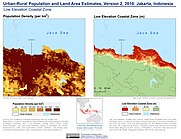
Back التغير المناخي في إندونيسيا Arabic Cambio climático en Indonesia Spanish Perubahan iklim di Indonesia ID 印尼氣候變遷 Chinese

Due to its geographical and natural diversity, Indonesia is one of the countries most susceptible to the impacts of climate change.[1] This is supported by the fact that Jakarta has been listed as the world's most vulnerable city, regarding climate change.[2][3] It is also a major contributor as of the countries that has contributed most to greenhouse gas emissions due to its high rate of deforestation and reliance on coal power.
Made up of more than 17,000 islands and with a long coastline, Indonesia stands particularly vulnerable to the effects of rising sea levels and extreme weather events such as floods, droughts, and storms. Its vast areas of tropical forests are vital in balancing out climate change by taking in carbon dioxide from the atmosphere.[4] Projected impacts on Indonesia's agricultural sector, national economy and health are also significant issues.
Indonesia has committed to reducing its emissions within the framework of the Copenhagen Accord and Paris Agreement. Despite the significant impacts of climate change on the country, surveys show that Indonesia has a high proportion of climate change deniers.
- ^ "The Importance of Mangroves to People : a Call to Action" (PDF). UNEP. Archived from the original (PDF) on 2019-10-12. Retrieved 2023-05-05.
- ^ "Climate change: the cities most at risk". The Week UK. 2 September 2021. Retrieved 2023-05-05.
- ^ "Photos: Where once were mangroves, Javan villages struggle to beat back the sea". Mongabay Environmental News. 2017-07-03. Retrieved 2023-05-05.
- ^ Chiappetta Jabbour, Charbel Jose; Seuring, Stefan; Lopes de Sousa Jabbour, Ana Beatriz; Jugend, Daniel; De Camargo Fiorini, Paula; Latan, Hengky; Izeppi, Wagner Colucci (2020-06-15). "Stakeholders, innovative business models for the circular economy and sustainable performance of firms in an emerging economy facing institutional voids". Journal of Environmental Management. 264: 110416. Bibcode:2020JEnvM.26410416C. doi:10.1016/j.jenvman.2020.110416. ISSN 0301-4797. PMID 32217311. S2CID 214679425.